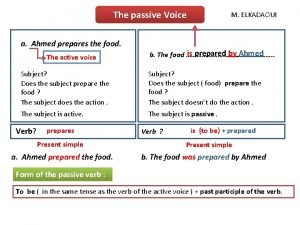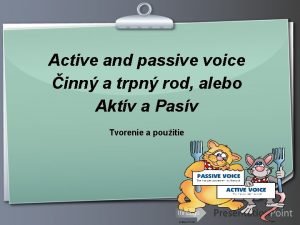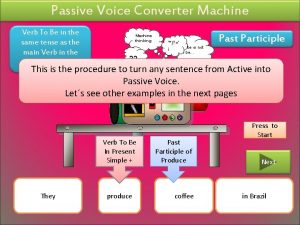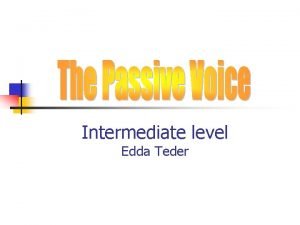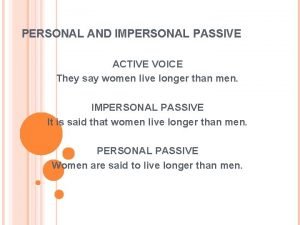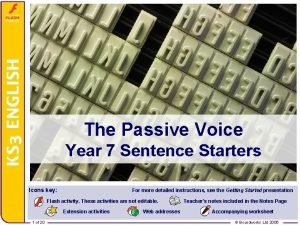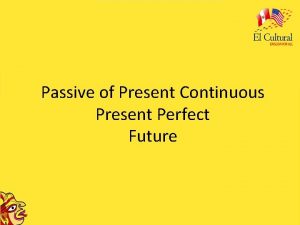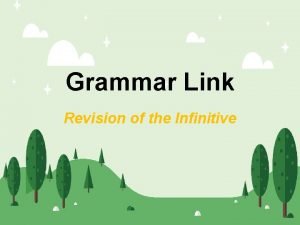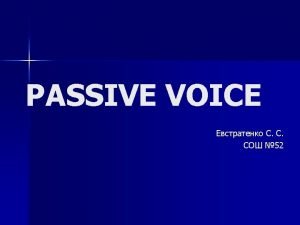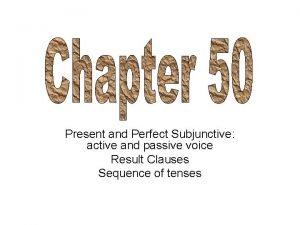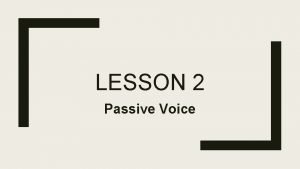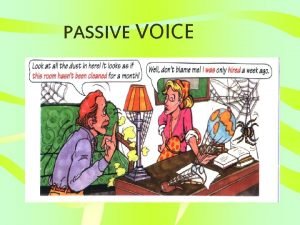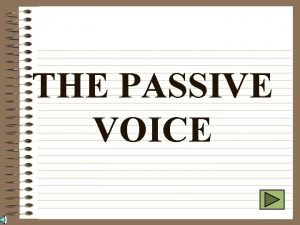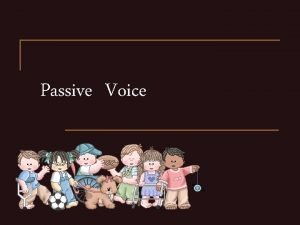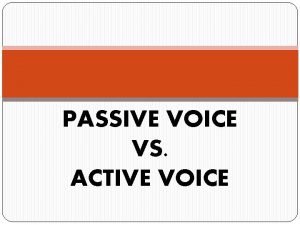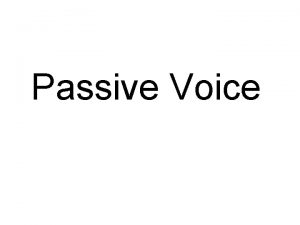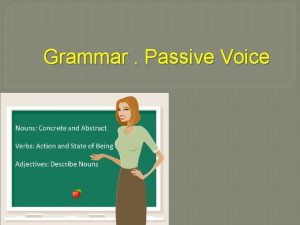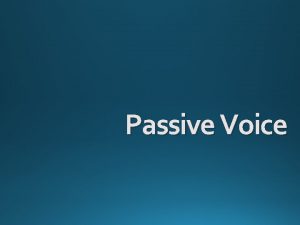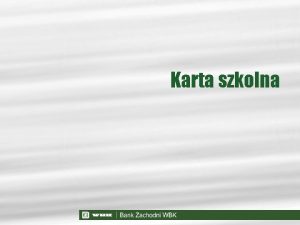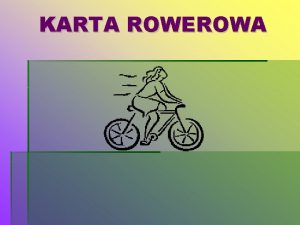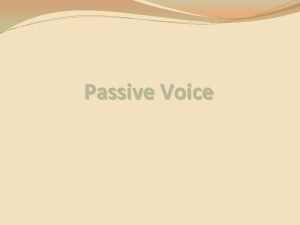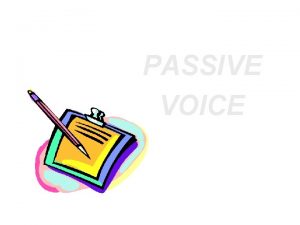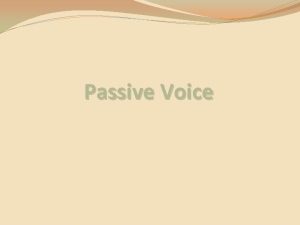Passive Voice At SMP 1 Sura karta ANTON















- Slides: 15

Passive Voice At SMP 1 Sura karta ANTON, S. Pd. , M. Hu m . 1

Passive voice is used when the focus is on the action. It is not important or not known, however, who or what is performing the action. Example: My bike was stolen. In the example above, the focus is on the fact that my bike was stolen. I do not know, however, who did it. Sometimes a statement in passive is more polite than active voice, as the following example shows: Example: A mistake was made. In this case, I focus on the fact that a mistake was made, but I do not blame anyone (e. g. You have made a mistake. ).

Form of Passive Subject + finite form of to be + Past Participle (3 rd column of irregular verbs) Example: A letter was written. When rewriting active sentences in passive voice, note the following: the object of the active sentence becomes the subject of the passive sentence the finite form of the verb is changed (to be + past participle) the subject of the active sentence becomes the object of the passive sentence (or is dropped)

Examples of Passive Tense Simple Present Simple Past Present Perfect Future I Hilfsverben Subject Verb Object Active: Rita writes a letter. Passive: A letter is written by Rita. Active: Rita wrote a letter. Passive: A letter was written by Rita. Active: Rita has written a letter. Passive: A letter has been written by Rita. Active: Rita will write a letter. Passive: A letter will be written by Rita. Active: Rita can write a letter. Passive: A letter can be written by Rita.

Tense Subject Verb Object Active: Rita is writing a letter. Passive: A letter is being written by Rita. Active: Rita was writing a letter. Passive: A letter was being written by Rita. Active: Rita had written a letter. Passive: A letter had been written by Rita. Active: Rita will have written a letter. Passive: A letter will have been written by Rita. Conditional I Active: Rita would write a letter. Passive: A letter would be written by Rita. Conditional II Active: Rita would have written a letter. Passive: A letter would have been written by Rita. Present Progressive Past Perfect Future II 5

Passive Sentences with Two Objects Rewriting an active sentence with two objects in passive voice means that one of the two objects becomes the subject, the other one remains an object. Which object to transform into a subject depends on what you want to put the focus on. Subject Verb Object 1 Object 2 Active: Rita wrote a letter to me. Passive: A letter was written to me by Rita. Passive: I was written a letter by Rita. As you can see in the examples, adding by Rita does not sound very elegant. That’s why it is usually dropped. 6

Personal and Impersonal Passive Personal Passive simply means that the object of the active sentence becomes the subject of the passive sentence. So every verb that needs an object (transitive verb) can form a personal passive. Example: They build houses. – Houses are built. Verbs without an object (intransitive verb) normally cannot form a personal passive sentence (as there is no object that can become the subject of the passive sentence). If you want to use an intransitive verb in passive voice, you need an impersonal construction – therefore this passive is called Impersonal Passive. Example: he says – it is said 7

Personal and Impersonal Passive � Impersonal Passive is not as common in English as in some other languages (e. g. German, Latin). In English, Impersonal Passive is only possible with verbs of perception (e. g. say, think, know). � Example: They say that women live longer than men. – It is said that women live longer than men. � Although Impersonal Passive is possible here, Personal Passive is more common. � Example: They say that women live longer than men. – Women are said to live longer than men. � The subject of the subordinate clause (women) goes to the beginning of the sentence; the verb of perception is put into passive voice. The rest of the sentence is added using an infinitive construction with 'to' (certain auxiliary verbs and that are dropped). � Sometimes the term Personal Passive is used in English lessons if the indirect object of an active sentence is to become the subject of the passive sentence. 8

A Look at the Intriguing History of Snowboarding By Keith Kingston

To say who actually invented the sport of snowboarding would be impossible because people have always loved to slide down a snow-covered hill. Soaring through the snow on some kind of seat or board is nothing new. The ways to enjoy the snow are numerous, and people have devised ways to turn garbage can lids and cardboard into ‘snow boards’ to enjoy an afternoon frolic outdoors. The various ways to glide through snow have become more sophisticated and have evolved into using polished boards or skis in much the same manner as a surfboarder would ride a wave.

There have been many attempts at developing a modern snowboard. In 1965, the ‘Snurfer’ (a word play on ‘snow’ and ‘surfer’) was developed as a child’s toy. Two skis were bound together and a rope was placed at the front end to afford control and stability. Over 500, 000 ‘Snurfers’ were sold in 1966 but they were never seen as more than a child's plaything even though organized competitions began to take place. The year 1969 brought a slightly more sophisticated snowboard based on the principles of skiing combined with surfboard styling. The ‘Flying Yellow Banana’ was developed in 1977. This was nothing more than a plastic shell covered with a top surface like that of a skateboard, but at the time it was considered a major advance in the little known sport of snowboarding. The first national snowboard race was held in the area outside Woodstock and was known as ‘The Suicide Six. ’ The race consisted of a steep downhill run called The Face in which the main goal was probably mere survival.

Snowboarding continued to increase in popularity over the next several years. In 1985 the first magazine dedicated specifically to snowboarding hit the news stands with huge success and furthered the popularity of this exciting sport. Hoards of fans began to organize regional events and pretty soon snowboarding events were held in all parts of the world. In the year 1994 snowboarding was finally declared an Olympic event, much to the delight of fans. The not-so-new sport of snowboarding was finally recognized and meant a huge victory for serious snowboarders across the globe. A collection of snowboarding tricks and stunts was released on video in 1996. Filmed in Alaska, the breathtaking beauty and captivating snowboarding techniques featured in the video exposed snowboarding to a new generation, and by 1998 snowboarding constituted almost 50% of all winter activity. Today, nearly all ski resorts accept snowboarders. There are still a few holding on to the past but this is unlikely to continue as the number of snowboarders continually increases. From the first crudely built snowboards to the advanced and specialized models available today, snowboarders have carried a ‘bad boy’ image. This rebel reputation is still common today in spite of the fact that snowboarding appeals to men, women, and children of all nationalities and social groups. At most major ski resorts you can find snowboarding gear, information, and lessons. Olympic and world wide snowboarding events are among the most popular of winter sports and the competition to be the best is fierce. Retailers nation wide and around the world carry many types of snowboards, and the choice in specially made snowboarding gear is immense. Snowboarders have participated in the X Games and even charity events such as Boarding for Breast Cancer. From its early meager beginnings snowboarding has progressed into a fully recognized sport, and large numbers of people are turning to snowboarding for adventure, fun, and professional recognition. Keith Kingston is a professional web publisher offering information on snowboards, skiing, ski vacations, snow removal and snowmobiles at all-4 -snow. com Article Source: Ezine. Articles. com Changed: 03 rd Jan 2005 02: 47

Exercises 1 Write passive sentences in Simple Present. 1. the documents / print …………… 2. the window / open ………… 3. the shoes / buy ……………… 4. the car / wash ……………… 5. the litter / throw away …………… 6. the letter / send ……………… 7. the book / read / not ……………. . 8. the songs / sing / not ………………. 9. the food / eat / not ………………. 10. the shop / close / not ……………….

Exercise 2 Write passive sentences in Simple Past. 1. the test / write …………. 2. the table / set …………. . 3. the cat / feed ……………. . 4. the lights / switch on …………. 5. the house / build ……………. . 6. dinner / serve …………… 7. this computer / sell / not …………… 8. the car / stop / not …………. . 9. the tables / clean / not ……………. . 10. the children / pick up / not ……………….

Exercise 3 Write passive sentences in Present Perfect. 1. the postcard / send ………. . 2. the pencils / count …………. . 3. the door / close ……………. 4. the beds / make …………. . 5. the mail / write …………… 6. the trees / plant …………… 7. the money / spend …………… 8. the room / book / not ………………. . 9. the rent / pay / not ……………… 10. the people / inform / not ………………. .
 Passive voice about food
Passive voice about food Passive cvičenia
Passive cvičenia Active to passive voice converter
Active to passive voice converter Future simple passive
Future simple passive The pattern of simple present in passive voice is.........
The pattern of simple present in passive voice is......... Active and passive voice
Active and passive voice Passive impersonal exercises
Passive impersonal exercises Passive voice
Passive voice Passive present continuous and present perfect
Passive present continuous and present perfect Traislate
Traislate Add passive voice
Add passive voice Somebody cleans the room every day.
Somebody cleans the room every day. Subjunctive passive
Subjunctive passive Maudslay court thunder bay
Maudslay court thunder bay The dishes are washed by my sister
The dishes are washed by my sister Capimini
Capimini
